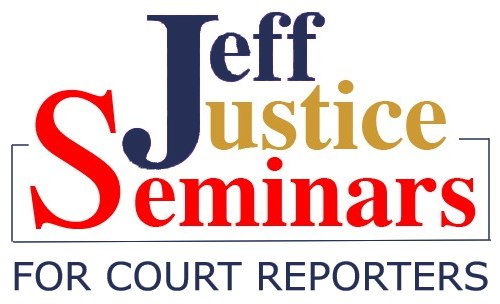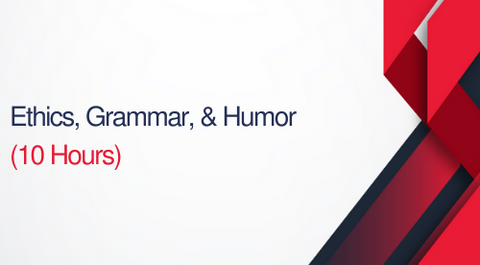SESSION 1: PRACTICE WHAT YOU PREACH
1.0 Hours (60 minutes)
Presenter: Pam Gwin Sheppard, CSR and Kathy McDaniel, CSR
Course Objective:
This hour-long presentation will give the reporter tools on how to get the most out of their practice time and how to reinforce and use what they learn. The session will involve a PowerPoint presentation.
Specific Topics:
-
Finding the time for practice
-
Focus & reet (using the five-second rule)
-
Quality versus quantity
-
Finder drills
-
Putting what you learned to use
Learning Outcomes:
The general objective is for the court reporter to learn how to incorporate strength-building exercises. The discussion will be on giving special attention to possible weak spots, i.e.; ELS, EGT; UGT, ULS, and other weak spots.
SESSION 2: WHAT'S HAPPENING OUTSIDE MY BUBBLE (ETHICS)
2.5 Hours (150 minutes)
Presenter: Pam Gwin Sheppard, CSR
Course Objective:
In this two-and-a-half-hour presentation, court reporters will explore the dos and don’ts of professional ethics be it NCRA or your individual state. We will discuss current house bills and what is happening in the profession.
Specific Topics:
-
Ethics old and new
-
NCRA Code of Professional Ethics dos and donts
-
How rules are changing
-
Federal rules
-
When is a situation unethical and how to handle
-
What you need to know to keep reporting in the spotlight
Participants will learn how to:
-
Change the narrative
-
Handle attorneys who don't know the rules
-
Dealing with new attorneys and judges effectively
-
Find current NCRA advisory opinions
-
Find your state's information regarding licensing, etc
-
How to search for rules and regulations quickly when needed
Appropriate Methodology:
This presentation will involve slides/handouts regarding Federal Rules, ethical situations, and changing rules in various states. You'll listen to group discussions on situational ethics.
SESSION 3: TECHNOLOGY 2.0
1.5 Hours (90 minutes)
Presenter: Pam Gwin Sheppard, CSR, and Kathy McDaniel, CSR
Course Objective:
This session will show the participants the importance of knowing your software, knowing shortcuts, how to tell when your audio isn’t working, how to fix problems on the fly, backups, Plan B, C, D, refreshing drivers, and keeping your software updated in today’s modern world of continually updated technology.
Seminar Topics:
The session will show the reporter how to use various software shortcuts to minimize editing time daily. It will also show how knowing your software can help you in a pinch when something goes wrong. It will show how you can stay calm in the face of technology issues by being prepared with Plans B, C, and D. We will discuss experiences with software issues during depos and court and how to quickly handle them during a quick break without making everyone wait for you. We will show you how to refresh your drivers periodically, so you don’t run into problems. We will show you how important tech support and keeping tech support on speed dial is important to your overall productivity. We will also show you some different ways to back up your information and the importance of always having your current dictionary backed up, including your personal and job dictionaries.
Learning Outcomes:
Court Reporters will learn to take a breath and fix issues quickly and efficiently. Reporters will also learn how to let others know they need help without creating a panic. We will use PowerPoint and handouts to show where to find software fixes, how to find drivers and update them, what type of backups are best, and always having a plan in case of technology failure.
SESSION 4: Court Reporting and the Mind/Body Connection
1.5 Hours (90 minutes)
Presenter: Kathy McDaniel, CSR
Course Objective:
This ninety-minute presentation will give an in-depth view of how the body and the mind are one. This session will teach levels of concentration and focus; how eating certain foods and sugars can affect the mid-day "drop”; the steps to take to avoid "nodding off" while writing; wearing non-restricting, circulation-friendly clothes and shoes.
Specific Topics:
-
My thoughts while writing!
-
Is my body reacting to my thoughts?
-
Am I focused on what's being said or "What's for dinner?"
-
Active alertness - Bringing your thoughts back to the present
-
Consequences of "nodding off."
Learning Outcomes:
Court reporters will learn how to "catch" their thoughts before rumination, what foods and drinks to avoid preventing sleepiness while writing, and how to keep yourself alert during testimony
SESSION 5: Tackling Digitals and Educating Attorneys
1 hrs (60 Min)
Presenter: Kathy McDaniel, CSR and Pam Gwin Sheppard, CSR
Course Objective:
This hour-long presentation will focus on ideas to keep digitals in their lane. There will be discussions on how freelancers can help officials to keep digital transcripts out of the courtroom. We will also discuss ways videographers can help keep us abreast of digitals invading depositions. We will discuss the importance of officials helping their judges understand the legality of accepting into evidence digital transcripts in states where digitals are not an approved method of reporting. We will also discuss the digital courses being taught in colleges in states where digital is not an approved method and how we can voice our disapproval respectfully to the deans of these colleges in informing them of the facts in our states about not being an approved method. The session will involve a PowerPoint presentation and instruction.
Specific Topics:
-
Identifying the states where digitals are not approved
-
How to discuss digitals with judges and attorneys
-
How to know when a digital took a record in depos in cases before your court
-
How to help attorneys understand when/where digitals are approved or not
-
Tackling the narrative that mask writers and machine writers are the same as digital
Learning Outcomes:
Court reporters will understand how to communicate facts to their judges and attorneys on the licensure requirements for their individual states and when and in what circumstances digitals can be used and the importance and security of their record.
SESSION 6: Sexual Harasser? Me?
1 hr (60 Min)
Presenter: Pam Gwin Sheppard, CSR and Kathy McDaniel, CSR
Course Objective:
This session is a new perspective on sexual harassment. Participants will learn if they are the ones doing the harassing and how to tell if someone thinks that they are being harassed. There will be be discussion, play-acting, and videos that will help show reporters how not to be the harasser. This session will show how to act professionally to keep yourself out of trouble in today’s litigious society.
Specific Topics:
-
When to joke
-
How to tell if you actually are the harasser
-
The art of being a professional and not getting involved in workplace sexual discussions.
-
Keep your hands to yourself
Learning Outcomes:
Court reporters will learn how not to be flirtations at jobs, when to joke and not to joke with attorneys/judges, keeping your distance on discussions regarding sexual topics in the workplace.
SESSION 7: Language Fun
1.5 hr (90 Min)
Presenter: Pam Gwin Sheppard, CSR, and Jeff Justice
COURSE OBJECTIVE:
In this fun, fast-paced presentation, we will cover common punctuation problems; when and when not to cap; numbers and addresses; when to use verbatim, phonetic or sic; and many more English problems reporters face daily. This is all to help in our daily transcript production. We will use quizzes and timed exercises for retention and competitive fun.
Participants will learn more about grammar than they want to …
Learning Objectives:
The main objective of this session is as a refresher on various English grammar and resources to aid in making the best transcripts possible. The goal is to help reporters to keep their skills fresh on preparing their best transcripts.
Specific Topics:
-
Punctuation problems
-
Number rules
-
VERBATIM, PHONETIC, SIC, OR RESEARCH
-
Soundalikes
-
Proofing
-
Homophones
















